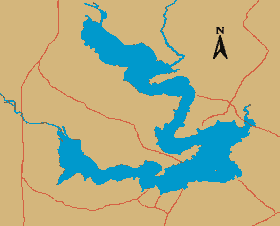Fishing
- Possession and Transport of Exotic Aquatic Species
- Licenses & Regulations
- ShareLunkers
- Fish Identification
- Fish Consumption
- Texas Freshwater Fisheries Center
Water Resources
- Texas Reservoir Levels
- US Army Corps of Engineers
- Texas Water Issues
- Golden Alga
- Aquatic Vegetation
5325 N. 3rd
Abilene, Texas 79603
(325) 692-0921
Michael Homer, Biologist
Nearby State Parks
Proctor Lake
Quick Links: Fishing Regulations | Angling Opportunities | Cover & Structure | Tips & Tactics
Lake Characteristics
Location: On the Sabana and Leon rivers
in Comanche County, off US 67 between the towns of Comanche
and Proctor
Surface area: 4,537 acres
Maximum depth: 34 feet
Impounded: 1963
Water Conditions
Current Lake Level
Conservation Pool Elevation: 1,162 ft. msl
Fluctuation: Moderate, sometimes
prone to long periods with dropping water levels
Normal Clarity: Slightly stained
to stained with visibility up to 3 feet
Reservoir Controlling Authority
US Army Corps of Engineers
Rt. 1, Box 71A
Comanche, Texas 76442
(254) 879-2424
Aquatic Vegetation
None
Predominant Fish Species
- Largemouth bass
- White crappie
- Hybrid striped bass
- Channel, blue & flathead catfish
Lake Records
Current
Fishing Report
Stocking History
Latest Survey Report
Lake Maps
None available
Fishing Regulations
All fishes are managed under statewide regulations.
Angling Opportunities
Proctor Lake supports tremendous populations of bass, shad, and crappie. It is recognized as one of the best hybrid striped bass lakes in the state. Florida largemouth bass were introduced in 1979.
| Species | Poor | Fair | Good | Excellent |
|---|---|---|---|---|
| Largemouth Bass | ||||
| Catfish | ||||
| Crappie | ||||
| White Bass | ||||
| Hybrid Striped Bass | ||||
| Sunfish |
Fishing Cover/Structure
Lake Proctor is characterized by acres of standing timber and willow trees in the upper end. When the water level is high, there are many more acres of black willow trees and buttonbush. Some areas present rocky cover and structure. In 2016, TPWD worked with local partner organizations to install brush piles and artificial reefs to provide additional cover for fish. Anglers may use GPS in conjunction with a fish finder to locate these structures.
Use the Habitat Structure Viewer for an interactive map of fish habitat structures and downloadable GPS coordinates.
Tips & Tactics
Trolling striper jigs and drift fishing live shad in the lower end of the reservoir works well. Keep an eye out for surface activity. Following the birds will often key in on schools of shad and hybrids. Crappie and catfish fishing can be very good at the spillway. Flipping plastic worms and jigs is probably the most effective technique for largemouth bass.
